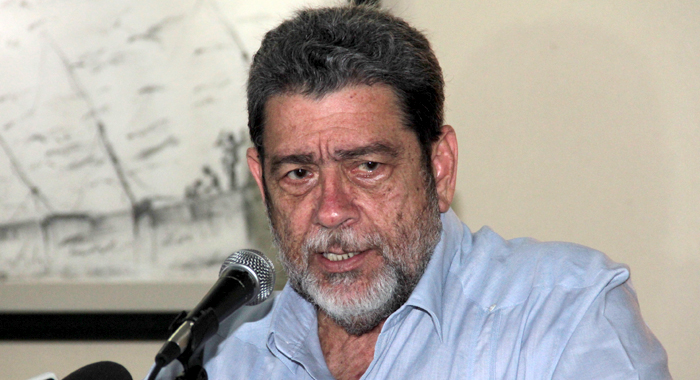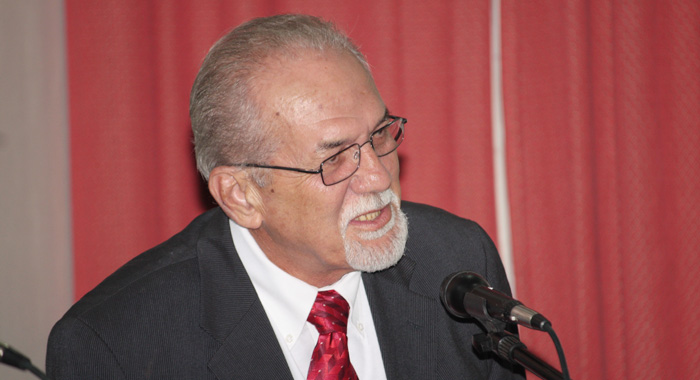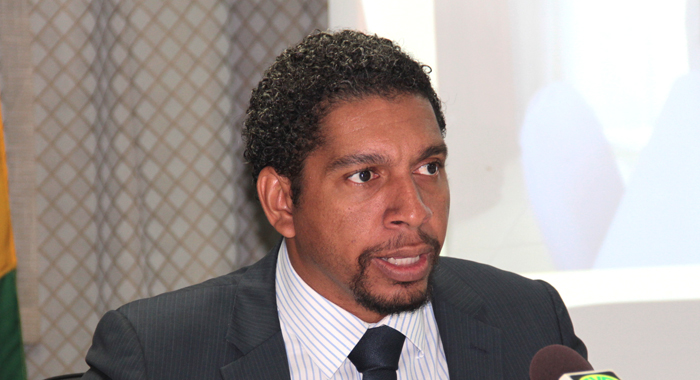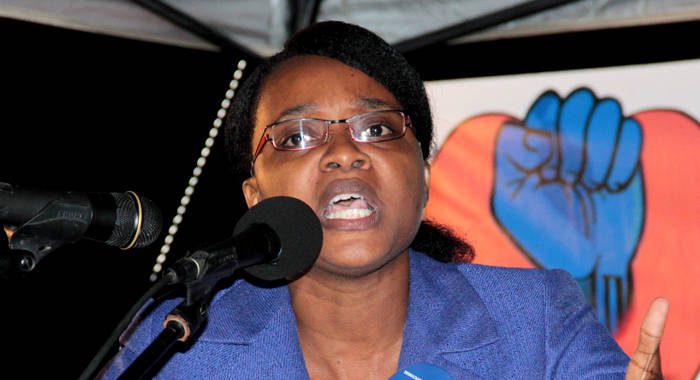Political activist Anesia Baptiste has written to the international freedom of the press watchdog, Reporters Without Borders (RSF) about the Cybercrime Bill before the St. Vincent and the Grenadines Parliament, presenting the committee reviewing the proposed legislation as composed mainly of members of Prime Minister Ralph Gonsalves’ Unity Labour Party (ULP) and his family.
Baptiste, who is leader of the Democratic Republic Party, which had no presence in Parliament, was asked to sit on the Select Committee by Minister of Information, Camillo Gonsalves, an elected Member of Parliament, who is also the Prime Minister’s son.
As part of its on-going protest against the results of the December 2015 general elections, which it claims that the ULP stole, the parliamentary opposition New Democratic Party (NDP), which holds seven of the 15 elected seats in Parliament, has refused to name anyone to the Select Committee.
Baptiste’s letter is the latest exchange of communications between Kingstown and Delphine Halgand, U.S. Director of RSF about the proposed legislation.
In a July 29 letter copied to Minister Gonsalves, Halgand, called for the revision of several clauses of the Bill, which RSF said “are extremely damaging to the free flow of news and information and to public debate”.
The Prime Minister, in his response two day’s later, said that before receiving the letter, changes had already been made to Clause 16 of the Bill, about which RSF, like local press freedom advocates, have expressed concern.
Gonsalves, however, remained steadfast in his support for criminal defamation, which RSF, like other press freedom advocates, say has a chilling effect on freedom of expression, and is further strengthened in the Cybercrime Bill.

The Prime Minister also sought to present the select committee as broad-based and consultative.
He told Halgand that comments by the general public were invited and several written submissions were made to the Office of the Honourable Attorney General, including two by independent journalists.
He noted that six members of the Government’s side in Parliament, including the Attorney General, who is a public servant, were named to the Select Committee but that the Opposition’s did not name anyone to the select Committee.
Gonsalves also told RSF that the Select Committee has invited several persons to appear before, and sit with it, to consider the Cybercrime Bill in detail.
These include representatives from the National Telecommunications Regulatory Commission; public servants from the Ministry of Telecommunications and Information; the Director of Public Prosecutions and staff; the President and Vice President of the St. Vincent and the Grenadines Bar Association; the President of the St. Vincent and the Grenadines Chamber of Industry and Commerce; and Baptiste.
But in a July 31 letter to Halgand, Baptiste acknowledged what the Prime Minister said about the constitution of the select committee, but asked that the RSF note “certain important facts”.
She said no youth-related NGO is represented on the select committee, neither is there no media, journalism or publishers’ representative.
“There is no representation from religious organisations who frequently broadcast programmes via internet radio in SVG,” Baptiste said.
The DRP leader noted that in the case of the Bar Association, which is represented on the Select Committee, its president, Rene Baptiste — who she did not mention by name — is a known supporter of the ULP, having served as an elected representative and cabinet minister with the said government for 10 years.
“Furthermore, the individual is the head of the Unity Labour Party’s (ULP) Women’s Arm since their May 2015 convention,” the DRP leader said.

And, while not mentioning him by name either, Baptiste spoke of Select Committee member, Sen. Julian Francis, who is General Secretary of the ULP and a government appointed senator and cabinet minister.
Sen. Francis, who is minister of Transport and Works, is a cousin of Prime Minister Gonsalves.
“Yet another government appointed Senator is a member of the committee who at the same time is seen by many as the ULP’s … caretaker for the constituency whose seat the individual failed to win in the recently concluded December 2015 general elections,” Baptiste said in reference former educator, Debbie Charles, who she also did not identify by name.
“The meeting has also seen attendance, on at least two occasions from a Crown Counsel in the Attorney General’s office who holds the position of President of the ULP’s Youth Arm since 2015,” she said in reference to lawyer Kezron Walters, son of SVG consul general in New York and former ULP MP, Selmon Walters.

“One cannot also escape the fact that of the government members appointed to select committee, the chairperson (the Prime Minister who tabled the Bill) is joined by his son (Minister of Information) and his cousin (an appointed Senator and Government Minister). On at least two occasions his daughter-in law (a legal drafter) was also present,” Baptiste said in the letter to RSF.
“There is clearly a problem of conflict of interest under such circumstances. It leaves much to be desired for the guarantee of the protection of the fundamental freedoms of ALL the people, when the review of this Bill is left up to a select committee constituted primarily of members of the same political party in government and also of the same family in high positions of power in the party in government,” Baptiste wrote.
Baptiste told RSF that while Gonsalves said in his letter that the private and public sectors consultation on the Bill with regional drafters began since 2013, the “first real introduction of the general public to this Bill was when it was read in the House of Parliament on 31st May 2016”.
Baptiste said that she has had a 100 hundred per cent punctuality rate in her attendance at the Select Committee meeting, three of which were held in June and three in July.
She noted that these meetings took place in the height of the Carnival season and further pointed out that the 33-page (8.5”x 11” pages) Bill was published in a newspaper on June 10 and the public was asked to make any written submissions by June 13 — after the two-day weekend.
“This was unsatisfactory and I raised the concern at the Select Committee meeting of 14th June,” she said.
Baptiste said that less than two months have passed since the publication of the Bill in the height of the Carnvial season, during which many were preoccupied with the festivities.
“This is not sufficient time and opportunity for careful study of this Bill which has the potential to impact negatively on God-given and constitutionally guaranteed freedoms of the people,” Baptiste said in her letter to the RSF.
She quantified as four, the “several written submissions” Gonsalves said the Select Committee has received on the Bill, noting that in two of the submissions (one from a journalist and another from a political activist), the writers registered their concerns about the short time available to the public for submission of comments on the Bill.
PM Gonsalves responds to RSF’s concerns about Cybercrime Bill







Anesia is a fighter, got to give her that.
This should be renamed ‘The Gonsalves Family Dynasty Cyber Protection Bill’
LOL! Someone else mentioned that they even have their own family bouncer!
perhaps terminator would be appropriate?
We have our very own wonderful African banana republic system of governance here.
Too bad 99 percent of Vincentians, including the old radical left — most of whom have been literally bought off — are unconcerned about or too doltish to comprehend the offensive parts of this legislation.
The good parts (e.g.,controlling and punishing child porn) are simple a smokescreen for the bad parts, namely controlling and punishing criticism of the regime.
Well put, I agree.
A Select Committee comprised of “injured parties”. Francis has already made his intentions clear on broadcast. There is no way he is a party that stands at arms’ length from this matter. He has made both veiled and explicit threats to the public on issued deemed to fall within the ambit of this legislation. It is lost on hardly anyone that he functions as the GOSVG go-to-guy-for the hardest and most intransigent cases and that he is the government bouncer extraordinaire, but really?